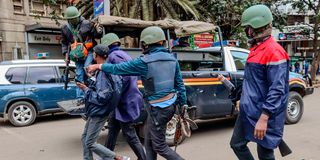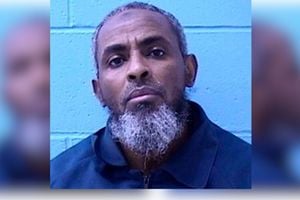Court: Police officers must have nametags or identifiable service numbers during demos

Police officers arrest a protester on Kenyatta Avenue in Nairobi during anti-Finance Bill protests on June 27, 2024.
The High Court has directed the acting Inspector General of Police Gilbert Masangeli to ensure police officers handling demonstrations have a nametag or identifiable service number.
Justice Bahati Mwamuye on Wednesday said where plainclothes or non-uniformed police officers are deployed, they shall not in any way hide or obscure their faces to render them difficult to identify.
“Pending the inter-partes hearing and determination of the application, a conservatory order be and is hereby issued requiring the 5th respondent (Mr Masangeli) to ensure that where plainclothes or non-uniformed police officers are deployed or utilised in any manner with regard to persons who are planning on assembling, demonstrating, picketing or petitioning, that police officers shall not in any way hide or obscure their face to render them difficult to identify or unidentifiable,” the judge said.
The Law Society of Kenya (LSK) moved to court stating that due to the non-identification of the plain-clothed police officers, protestors endure extrajudicial killings, illegal arrests, abductions, detention, intimidation, harassment, torture, cruel, inhuman and degrading treatment and other excesses and violence.
Through lawyer Dudley Ochiel, the LSK said the incognito appearance has enabled the officers to blend in with the peaceful protestors who were exercising their constitutional rights.
He said the plainclothes police did not carry any form of identification and thus could not be distinguished from members of the public.
The court directed the case to be mentioned on September 17, after the Attorney General and the Inspector General of Police had filed their responses.
Civilian clothes
“To allow members of the police service to don civilian clothes and make them unaccountable cannot be said to be striving for the highest standards of professionalism and discipline among its members. Neither can it be said to be making the National Police Service transparent, accountable nor respecting human rights and freedoms,” Mr Ochiel submitted.
He said the plain-clothed police officers, who are unidentified, cannot be held accountable for their actions and as a result, these plain-clothed police officers, without care in the world, use excessive force, abduct and even kill demonstrators.
“Yet, these plain-clothed police officers cannot be held accountable because they are unknown and unidentified,” he said, adding that unless this trend is urgently stopped, Kenyans risk death, inhuman and degrading treatment and a complete denial of their rights under the Constitution.
The LSK has named three police officers who were allegedly captured arresting protestors, yet they were not in uniform.
Mr Ochiel said some of these police officers were in civilian clothing, covering their faces with masks, balaclavas and other clothing to disguise themselves as goons and militia.
They include Martin Mbae Kithinji, who while in civilian clothing manhandled Hanifa Farsafi on June 18, 2024, while unlawfully “arresting” her at a peaceful and unarmed protest at the Archives of Kenya.
Accountable police service
The LSK has also named Isaiah Ndumba Murangiri and Moses Mutayi Shikuku, the officer in charge of Central Police Station and Adamson Bungei, the Nairobi county commander.
The LSK said the police have been threatening the creation of an accountable national police service as their actions undermine articles 10 and 244 of the Constitution.
“By deploying plain-clothed police officers, the Respondent’s action creates a chilling effect on exercising the right to demonstrate,” Ms Florence Mutua, the LSK chief executive officer said in an affidavit.
The LSK will be asking the court to declare Chapter 31, Regulation 21 of the National Police Standing Orders as unconstitutional to the extent that it allows for the use of plainclothes by police officers against a person exercising the right to assembly, demonstration, picketing and petition a public authority.
Further, LSK will also be asking for payment of damages in the range of Sh5 million against the government and the five police officers, jointly and severally to be paid from personal funds and to be used for legal aid in cases concerning police accountability.





